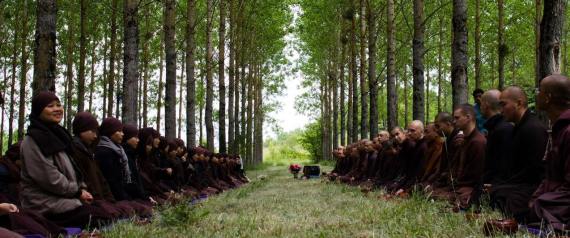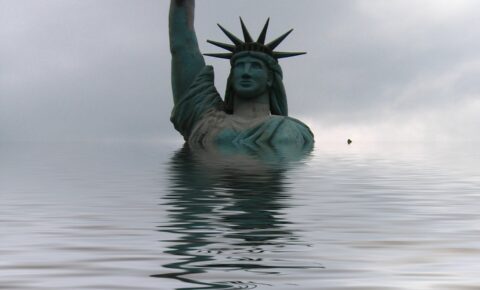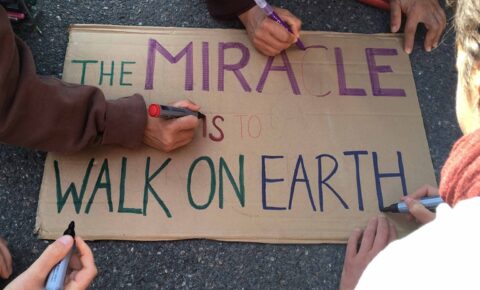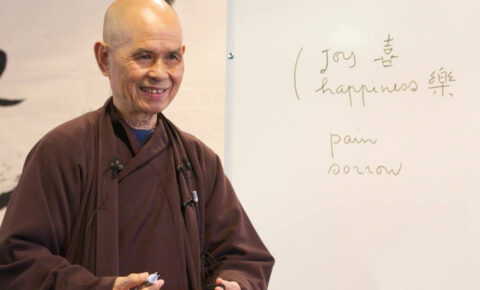This article was published on The Huffington Post:
What We Can Learn From
Buddhist Insights for the Climate Crisis

On October 29 our Teacher, Thich Nhat Hanh, came together with His Holiness the Dalai Lama and Buddhist leaders from over a dozen countries to make a common declaration on climate change to world governments ahead of the Paris Climate Summit this December. It is a continuation of his tireless engagement to bring compassion and insight to the climate crisis, and builds on his powerful message “Falling in love with the Earth,” submitted to the United Nations in 2014.
“We are on course to self-destruction,” said Thich Nhat Hanh, speaking in France in June last year. “Many civilisations on Earth have been destroyed, because they could not live in harmony with nature. If we continue like this there is no doubt that our civilisation will be destroyed. Earth may take many millions of years to heal, to re-establish her balance and restore her beauty. For the Earth, it’s not a problem. But for us humans it’s a big problem. We will disappear from Earth.”
“We need more than just new technology to protect the planet,” he says. “We need real community and co-operation. We need to re-establish true communication — true communion — with ourselves, with the Earth, and with one another as children of the same mother.”
The international declaration also includes the signatures of over 40 Plum Village Dharma Teachers, monastic and lay, from the U.S., Europe and Asia. The Plum Village International Community of Engaged Buddhists, founded by Thich Nhat Hanh over 40 years ago, is the largest community of its kind in the world, with over 1,300 local groups and over 800 monks and nuns. Every year at Plum Village practice centres and retreats, tens of thousands of people are trained in “the art of mindful living” in harmony with one another and the Earth. Over 100,000 people have made a commitment to follow Thich Nhat Hanh’s Five Mindfulness Trainings, a simple, practical ethical code for daily living in the 21st Century that has the power to heal and transform not only our individuals live and family life, but also our society and the planetary situation.
“Everyone can do something,” says Sister Chan Khong, the most senior nun in the Plum Village community. “We can make a difference, starting today. We can eat 50 percent less meat. That is a big act of compassion for ourselves, for the planet, and for the little cow, sheep, pig or chicken. If we look deeply and contemplate the beauty and dignity of these animals when they are alive, the suffering they endure in the abbatoir, and the destructive impact of industrial meat farms on the Earth, compassion will be born in our heart. Reducing the amount of meat we eat is not an obligation or duty. It arises naturally out of love.”
“What we do as an individual is deeply interconnected with the collective. Each one of us can make a promise to do one thing to help. We can turn off extra lights, not use plastic bags, or eat vegetarian a few days a week. We are part of the bigger change. A little love can become Great Compassion, for all people and for all beings. The act may be small, but it contains our intention of love and mindfulness of what is happening to our precious home.” It is in this spirit that our international community will be coming together to support the Global Climate March on November 29th, and to send compassionate energy for the success of the Paris Climate Summit.
For decades, Thich Nhat Hanh has been a leading international figure calling for a radical shift in the way of thinking and acting to address the situation of climate change. He helped convene the ground-breaking Dai Dong Environment Conference of Scientists back in 1970 (a key stimulus to the UN’s first ecology summit), triggered a global initiative of national “No-Car Days” under the auspices of UNESCO in 2006, and has published bestselling books on Buddhism and ecology, The World We Have(2008) and Love Letter to the Earth (2013). In 2007 he led tens of thousands of his followers in shifting to a vegan diet. “In the past Buddhists were vegetarian with the intention to nourish our compassion towards animals. Now we know we should be vegan in order to protect the Earth.”
In recent years Thich Nhat Hanh has contributed a powerful new spiritual dimension to the climate crisis, one that has inspired UN Climate Chief Christiana Figueres. “We need to change our way of thinking and seeing things,” he has said. “We need to wake up and fall in love with Earth.” The deepest root of our current crisis is, he says, “the wrong view that you and the Earth are two separate entities: you think the Earth is only the environment. You are in the centre and you want to do something for the Earth in order for you to survive.” But this, he says, “is a dualistic way of seeing things. It does not have the insight of interbeing. The Earth is so much more than simply your environment.” This insight of interbeing is a unique Buddhist contribution to the climate change crisis. Love, compassion, generosity, and the insight of our mutual interdependence are, he suggests, what is needed — both in December’s talks and long into the future. “Only when we truly love the Earth will our actions spring from reverence and the insight of our interconnectedness. That’s the kind of awareness, the kind of awakening that we need. The future of the planet depends on whether we’re able to cultivate this insight or not. It is our love for the Earth that will give us enough compassion, strength and insight to change our way of life.”
Living simply, and staying connected to ourselves, our loved ones, and the Earth is key. “Centuries of individualism and competition have brought about tremendous destruction and alienation,” he says. “Many of us are lost, isolated and lonely. We work too hard, our lives are too busy, and we are restless and distracted, losing ourselves in consumption. We buy and consume things we don’t need, putting a heavy strain on both our bodies and the planet.” Thay describes what he calls “the spiritual pollution of our human environment”: the toxic and destructive atmosphere we’re creating with our way of consuming, in the films we watch, the news or magazines we read. These, he says, all-too-often water the seeds of fear, anger, greed and hatred in our consciousness. He encourages us to consume in such a way that keeps our compassion, peace and generosity alive. “We don’t need to consume a lot to be happy; in fact we can live very simply. With mindfulness, any moment can become a happy moment. Savoring one simple breath; taking a moment to stop and contemplate the bright blue sky; or fully enjoying the presence of a loved one, can be more than enough to make us happy.”
During the height of the Vietnam War, Thay reminded us that “Man is not our enemy. The real enemy is our ignorance, discrimination, fear, and violence.” The enemy now is not our governments or corporations, but the energy of greed, mindlessness and indifference. If in the Vietnam War we needed to stop shooting each other, in our current planetary crisis we need to stop our rampant culture of consuming and exploiting. It is a challenging time because the front line is not to be found in the battlefield, but within ourselves. We must take responsibility for our part, in our way of living and in our choices in each moment. Only then can we say that we love the Earth. Only then will we have a chance.





Share Your Reflections